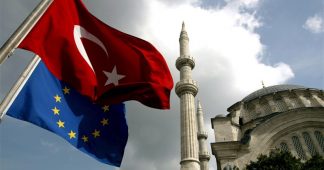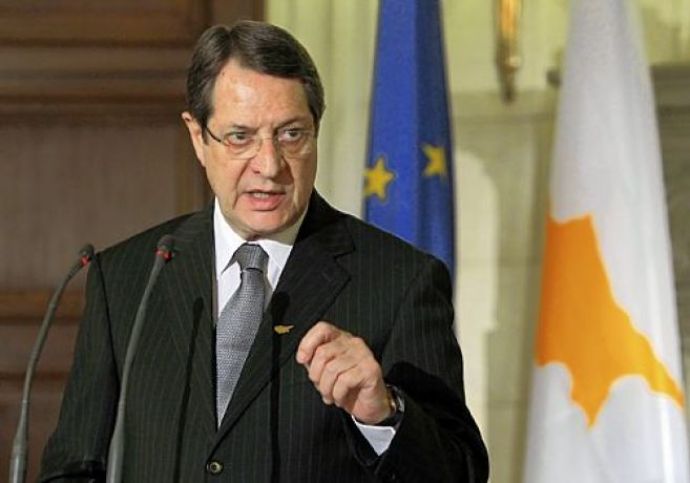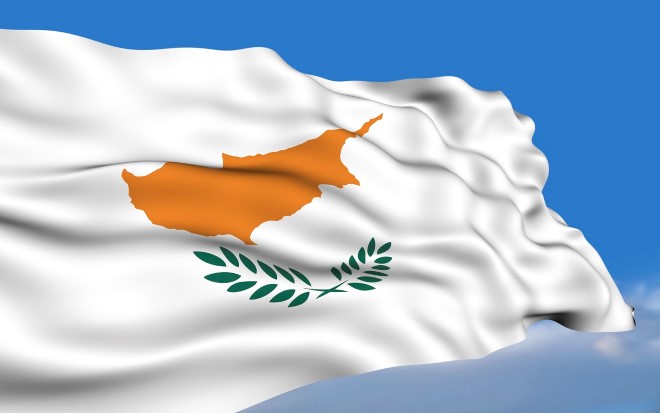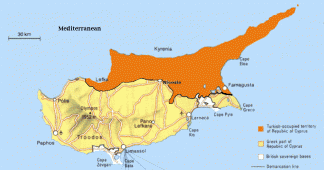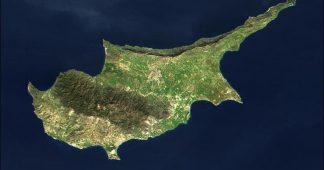By Costas Melakopides
At a time when the international community was depressed because of Syria’s humanitarian catastrophe, Europe’s democratic deficit and ethical disintegration, and the concomitant legitimation crisis, an orchestrated diplomatic aberration, akin to an international scandal, was unfolding on and about an EU-member-state, the Republic of Cyprus. This short essay intends to demonstrate the embarrassing absence of a deontological treatment –according to solid international legal norms and ethical obligations- of the ongoing Cyprus political/legal/ethical tragedy by major international institutions, their chosen representatives, and powerful states whose narrow-hearted, self-regarding, geopolitical interests allow them to violate with impunity cardinal international legal principles and ethical norms.
To begin with, what does this ongoing “political/legal/ethical tragedy” of Cyprus consist in? For those less tutored in the labyrinthine intricacies of the “Cyprus problem”, here is a most laconic summary, based on the solid principles of international law and international ethics. Exploiting a coup d’etat of a still obscure origin perpetrated by the Athens junta (that had been inspired if not created but then tolerated and openly assisted by Washington and NATO), Turkey invaded Cyprus twice in the summer of 1974 and occupied 37 percent of its territory. Ankara’s disingenuous rationalizations of the invasion were universally rejected, hence the regime in the occupied territory remains unrecognized by the entire world except for Turkey! For 43 years, the manifest illegality has established a political and ethical tragedy, because the illegal occupation amounts to an unbearable violation of elementary human rights, primarily of the Greek Cypriot majority of the country. Moreover, since Cyprus is an EU-member-state since 2004, Turkey’s occupation of Cypriot territory is tantamount to the occupation of EU territory. Given, however, the glaring asymmetry in size, population and geopolitical significance between Cyprus and Turkey, the latter has been progressively favoured by the “international community” (that is, the United Nations, Washington, London, and lately the European Union) in their efforts to “resolve” the Cyprus problem. Hence, the “Annan plan”, engineered by the UN Secretariat (under the aegis of Lord David Hanney) attempted to exculpate Turkey in order to “reunite” the Island-state but under unfair and unworkable conditions. This explains why the plan was rejected by 76 percent of the Greek Cypriot majority in the May 2004 referendum. Now, according to that very plan, should either Cypriot community reject it, it would be “null and void”. And yet, it has been shamelessly “revitalized” by the UN Secretariat and by former State Department official, Ms Victoria Nuland, who reportedly imposed through familiar muscle-flexing a new “resolution framework” on President Nicos Anastasiades and Turkish Cypriot leader Eroglu, on 11 February 2014. Thus, Cyprus’ “bi-communal negotiations” have been formally taking place yet again but, on reflection, they constitute a protracted performance akin to Theatre of the Absurd. We therefore need to evaluate this performance and reveal the massive deception perpetrated under the formal auspices of the United Nations.
Put succinctly, Cyprus’ “negotiations between the Greek-Cypriot and Turkish-Cypriot communities” represent a multiple misnomer for numerous evident reasons. First, the negotiations are not “bi-communal” because, manifestly, the Turkish Cypriots are not autonomous or free, since they operate as proxies for Ankara which is the unmovable mover of the “Turkish Republic of Northern Cyprus”, the illegal and still unrecognized regime.
Second, these “inter-communal” discussions cannot be labeled “negotiations” since they are pursued under the constant psychological warfare and naked threats of Ankara, and under the barrel of the guns of the 40000 Turkish troops illegally stationed on the Island since the 1974 Turkish invasion.
Third, the so-called “negotiations”, allegedly conducted by the United Nations, constitute a protracted international scandal. As Aris Petasis and William Mallinson wrote in “Friendly Cyprus Now Needs Russia’s Voice More Than Ever” (Defend Democracy Press, 10/12/2016)
…the situation in Cyprus is worse than what one imagines, considering that America, Turkey’s staunch supporter, is calling the shots in these negotiations that are masquerading as UN-sponsored. All one has to do is check the CVs of the UN representatives (past and present) in the talks to understand who is behind these negotiations.
Among other things, the “framework” being negotiated not only echoes unmistakably the overwhelmingly rejected “Annan plan” but arguably contains many worse features. Therefore, the current “bi-communal negotiations”, essentially highjacked by Ms Nuland’s uncouth manipulation, employ a framework that has been tolerated by the UN Secretariat, even though it contradicts manifestly the UN Charter’s legal principles and ethical norms. For, among other things, the framework commits the gigantic fallacy-deception to treat an international problem –that is, a problem of invasion, illegal occupation, and violation of human rights- as if it were a domestic issue of communities in conflict.
Fourth, in August 2014, Norwegian politician, Mr Espen Barth Eide, was appointed Mr Ban Ki-moon’s Special Adviser on Cyprus. Mr Eide was thus succeeding Mr Alexander Downer, who was forced to resign the post of UNSGSA, after a series of scandals that revealed his palpable pro-Turkey biases that relegated him to the status of persona non grata. Unfortunately, his Norwegian successor began himself his Cyprus appointment on the wrong footing. His statements from the very beginning demonstrated that Mr Eide had limited, hence distorted, understanding of the real nature of the Cyprus problem; had only superficial knowledge of the UN’s relevant resolutions on the Republic of Cyprus; had a penchant for misinforming international institutions and word public opinion (as when he asserted that the two sides had all but reached final agreements hence the referenda would be taking place in March 2016!); from the outset, he made strenuous efforts to elevate Turkish Cypriot leader, Mustapha Akinci, that is, the leader of the illegal and unrecognized regime of occupied Cyprus, to a level equal to that of the Cypriot President; and even more ominously, Espen Barth Eide had openly endorsed some of Turkey’s favourite Cypriot mythologies. For instance, he once asserted that, for the Turkish Cypriots, the Republic had been “usurped” by the Greek Cypriots in 1964. He revealed, therefore, that he ignored a cardinal fact about the Cyprus problem: namely, that UN Security Council Resolution 186 of March 1964 had determined that the Nicosia Government was the unquestioned legal representative of the Republic of Cyprus, thereby condemning by clear implication the Turkish Cypriot rebellion that had erupted in December 1963 aiming to partition the Island. Thus, Mr Eide, soon succeeded in disappointing Greek Cypriot civil society and infuriating independent analysts and opposition political elites. However, the Anastasiades administration, permanently intimidated by Ankara and scared to stand up against international diplomatic manipulation, has resisted endorsing the sustained calls –by leading analysts and the Centrist political elites- to declare the UNSGSA persona non grata.
Fifth, Mustapha Akinci’s emergence in April 2015 as leader of the Turkish Cypriot community generated optimistic expectations among many Greek Cypriots, convinced that he was marked by Social Democratic moderation and, as an architect by profession, by civility and sophistication. After all, Nicos Anastasiades started showering him with enthusiastic friendship and even affection, insisting that the two of them were “sharing a common vision”. But while naïve Greek Cypriots were envisaging that the “common vision” related to a Cyprus settlement that would be fair and functional, Akinci was hiding impressive cunning under polite demeanor. For he soon demonstrated that he was not willing to (even try to) resist succumbing to Recep Tayyip Erdogan’s diktats. He therefore became Erdogan’s veritable mouthpiece, uttering all kinds of unacceptable demands that were signaling what Ankara was long suspected for: that a Cyprus “settlement” can only be envisaged by Turkey as long as it was tailor-made by Turkey for Turkey’s own (and not even the Turkish Cypriots’) interests and ambitions. Once again, therefore, it was being proven beyond doubt that the so-called “bi-communal” negotiations were taking place between a partially occupied state and its occupier and not by two free and autonomous communities.
Finally, Cyprus’ allegedly “inter-communal negotiations” represent an additional political anomaly, in that the President of the Republic, in the eyes of most Greek Cypriots, the Centrist opposition leadership, and in the columns of established analysts has not been “negotiating” but is essentially “surrendering” to Turkey’s humiliating demands. Indeed, Nicos Anastasiades has been gradually abandoning most traditional Greek Cypriot “red lines”, either created by the National Council or expressed by Centrist political elites in order to shape sine qua non conditions for a fair and workable type of resolution. Instead, President Anastasiades has been unable to resist the escalating Turkish demands, apparently fearing that ending these “negotiations” might generate a “blame game” that his (as the weaker) side would lose.
Given that Nicosia’s present government seems imprisoned in an untenable position resulting from its having relied on deceptive promises by international actors and its own delusions -regarding “resolving” the country’s problem at a time of President Erdogan’s manifold failures and intensified belligerence- objective rational analysis is urgently required to set the record straight and to prevent, inter alia, the unpalatable implications for the weak side of yet another failure to “unfreeze” the Cyprus problem.
As regards “setting the record straight” on the nature of the Cyprus problem and the manipulative diplomatic engineering of recent years, my book, Russia-Cyprus Relations: A Pragmatic Idealist Perspective (London: Palgrave, 2016) may be profitably consulted. For it reveals, for the first time in book form, how London, Washington and Ankara have subjected Cyprus to unbearable misery at least since the mid-1950s, whereas Moscow has stood up, almost without exception, for the Greek Cypriots’ rights and needs. In this manner, inter alia, the book is capable of explaining the Greek Cypriots’ gratitude to Moscow and the Russian people as well as their constant expectation that the Russian Federation will keep coming to their defence, through verbal and non-verbal actions, in the Security Council and in other fora. In this connection, it should be emphasized that, despite repeated and clear expressions of Russian (and French) interest in participating in the January 2017 Geneva Conference on Cyprus, Espen Barth Eide succeeded in blocking such participation.
It remains to submit a couple of modest suggestions as defensible means to escape Cyprus’ dramatic cul-de-sac. First, Nicos Aanastasiades’ failures, coupled with his quasi-theatrical public performances that have long been misleading and confusing public opinion, have led serious analysts (including influential columnists of Nicosia daily “Simerini”) –echoing widespread public sentiments- to call for his resignation. Should he resist this outlet, and given the escalating anger and frustration experienced by the Cypriot Greeks, it is conceivable that they may begin demanding this resignation by sustained demonstrations outside the Presidential Palace, precisely as they did against former president Dimitris Christofias in 2011.
Secondly, a more immediate goal should be the removal of Espen Barth Eide from his post by appealing to Antonio Guterres, the new Secretary General, who is undoubtedly far more competent and manifestly far more perceptive than his predecessor. Such a development may not be that hard to attain since it has been widely reported that the Portuguese Social Democrat has already experienced tensions with the Norwegian SA following the January 2017 diplomatic fiasco in Geneva.
Thirdly, Cyprus’ presidential election is fast approaching (March 2018). Already, Greek Cypriot public opinion is abandoning the current conservative president while left-wing AKEL, Anastasiades’ faithful companion during the Cyprus “negotiations”, has declared that they will not support Anastasiades’ re-election. And given AKEL’s ongoing political weakness, following Christofias’ disastrous administration (2008-2013), it seems to follow that Greek Cypriot civil society will be eager to identify and mobilize an electable Centrist politician. He or she will emerge from the group of the like-minded regarding the correct nature of the Cyprus problem –as a problem of invasion, occupation and violation of human rights- and the need to shape alternative strategies founded precisely on the refusal to exculpate Turkey for its Cyprus-related crimes and the concomitant need to employ strategies and tactics to create costs to Turkey, since it has been proven beyond doubt that appeasement has failed miserably in Cyprus’ case as well.
Finally, Greek Cypriot civil society and the Centrist opposition to Anastasiades should keep demanding greater involvement of the Russian Federation in the future discussions regarding a Cyprus settlement. For while there is constant and manifold assertion of Russian interest in such involvement, Espen Barth Eide and Nicos Anastasides have resisted it to date, for reasons that should be manifest by now.
*Costas Melakopides is Associate Professor of International Relations (ret.) at the University of Cyprus and author of Russia-Cyprus Relations: A Pragmatic Idealist Perspective (London: Palgrave Macmillan, 2016).
